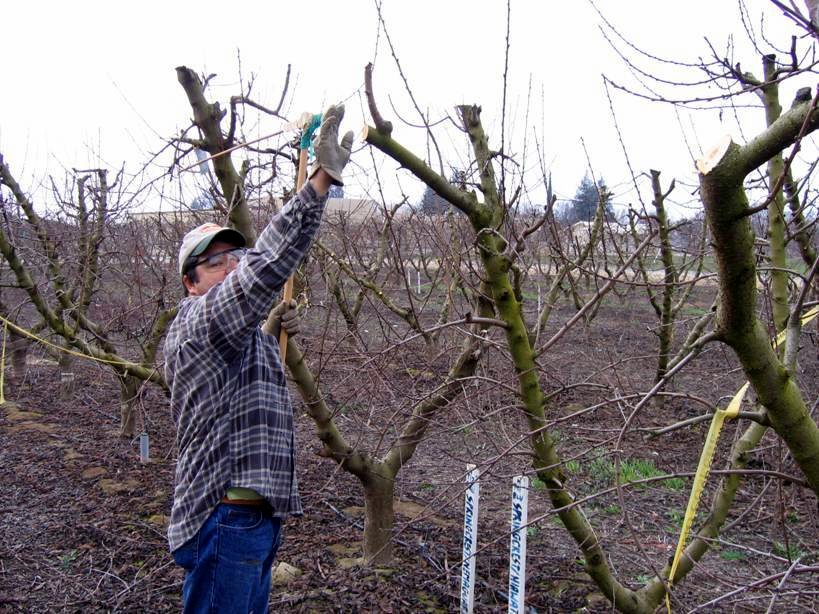May 7, 2014

Can shorter peach and nectarine trees reduce labor costs without sacrificing fruit quality and yield?
The answer to this million-dollar question may develop soon at a four-acre test orchard at the University of California (UC) Kearney Agricultural Research and Extension Center located south of Fresno.
UC researchers are planting semi-drawfing rootstocks in various densities and configurations in a large, integrated experiment on virtually every aspect of peach and nectarine production.
“We’re designing ‘ladderless’ orchards which have the potential to cut labor costs by 50 percent or more and improve worker safety,” said UC Cooperative Extension (UCCE) specialist Ted DeJong.
DeJong and Kevin Day, UCCE farm advisor in Tulare County, are leading the unprecedented experiment.
Conventional peach and nectarine trees typically reach about 13 feet in height. To prune trees and harvest fruit, workers use ladders, which consume about 50 percent of the workday, to set up, climb, and move.
Ladders are dangerous. This is why peach and nectarine growers pay about 40 percent more for workers’ compensation insurance.
Smaller trees
Developed by UC breeders, the new rootstocks will produce trees 7-8 feet tall which can be pruned and harvested from the ground.
With the right orchard management - which Day and DeJong will test in the plots - the shorter trees could produce just as much high-quality fruit as their lofty kin.
“Ladder-less orchards would be huge for our industry,” said Bill Chandler who grows several varieties of peaches and nectarines on his 250-acre Chandler Farms in Selma, Calif.
“There are so many costs associated with ladders that many growers are switching over to almonds just to stay in business,” Chandler said. “It costs me $1,400 an acre to thin our trees.”
Rod Milton, a fourth-generation stone-fruit grower, said he would welcome a ladder-less system for his peaches and nectarines grown in Reedley, Calif.
“Even with conventional rootstocks, I prune my trees so workers can take two fewer steps on the ladder come harvest time,” Milton said. “And the savings are huge, even with that. It’s important to keep farm work safe. And it’s important to keep farming viable, or else we’ll be getting all our produce from overseas.”
Best management practices
Shorter trees are just one of the elements of DeJong’s and Day’s experiment, which also explores best practices for keeping peach and nectarine production economically and environmentally sustainable.
Funded by the UC Division of Agriculture and Natural Resources, the project will integrate virtually every UC pomology advancement over the past 30 years.
“We’ve tested everything from optimal fertilizer regimes to improved pruning systems to best methods for monitoring a tree’s water needs, but before this, we never had the funding to incorporate all the concepts into one model orchard,” Day said.
The team will plant conventional, tall trees in one plot and cultivate using standard irrigation, fertilization, and pruning practices.
In three other test plots, shorter trees will be grown with new best management practices including minimal pruning, using pressure chambers to measure a tree’s water needs, and applying compost and nitrogen sprays to minimize nutrient leaching and groundwater contamination.
For all four plots, the researchers will compare fruit size, yield, canopy light interception, water, nitrate leaching, and more.
“We’re excited to take our experiments to the next level to provide growers what they (growers) need to make good management decisions,” Day said.
Growers are excited too.
“If it wasn’t for people like Ted DeJong and Kevin Day, I’m not sure there’d be any of us peach and nectarine growers left,” Chandler said. “They work so hard to make farming efficient.”
The team will start planting in Spring 2015. Preliminary data should be available by 2016.
Beyond fruit, the experiment will produce another vital element to peach and nectarine production.
DeJong said, “We’ll be offering internship opportunities to graduate students so they can work alongside us and get hands-on experience.” DeJong said.
For more information, contact DeJong at (530) 752-1843 and [email protected]; or Kevin Day at (559) 684-3311 and [email protected].
You May Also Like




